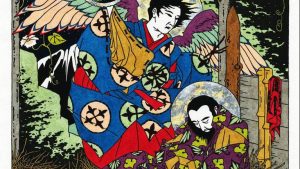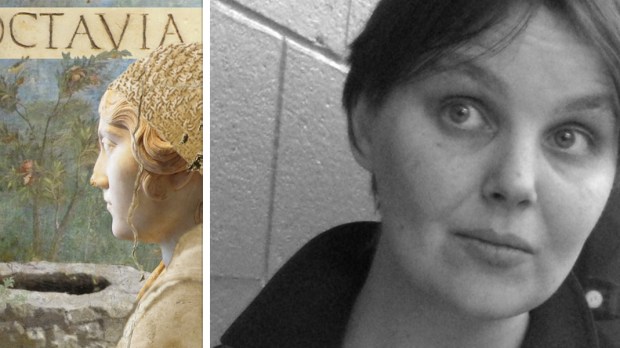She’s been talking about it for a long time, but author Melinda Selmys has finally written her first novel, and it is a humdinger of a horror story!
Octavia, recently released by Vulgata, is a foray into Catholic fiction — a thriller that takes a look at the question of secrets, sins, and accountability. It is creepy, but in a fun way, smart, but in an accessible way, and geeky, in a punny and humorously literate way.
It’s also a story about friendship, and about a family who lives in the modern world while trying to live as though they are in ancient — read “pagan” — Rome. So there are a lot of mythological elements tying together the title character’s family life with the evil she is confronting.
“Are you not entertained?” asked a famously pagan gladiator of his audience. Well, with this book, you will be. Selmys agreed to answer a few questions about Octavia, its genesis, her influences, and how the creative process deepens one’s relationship with God.
Aleteia: So I’m seeing old and new ideas here. What was the inspiration for your novel?
Melinda Selmys: Well, a lot of supernatural horror involves exploring the inverse of holy things. Stories of demonic possession obviously rely on that to a large extent. The zombie genre explores a kind of resurrection in which only our most inhuman qualities remain. The blood-drinking in the vampire genre is clearly a reverse image of the Eucharist – especially if you go back to Bram Stoker. So I was looking at other sacraments as a possible source for original horror and came up with the idea of a kind of dark confessional: this “Well” where sins and secrets are hidden away, literally taken out of the world, but in a way where they no longer have consequences and so repentance becomes impossible.
That’s interesting, because I think what you’ve said here is part of the reason some Catholics shy away from horror: because the horrific seems to involve an inversion of the good. And I think there’s a fear that when you do that, you end up glamorizing evil, or even if you enjoy the story, you’re somehow registering approval of the darkness.
Well, obviously in any good horror the goal is to overcome the evil. I think there’s a huge problem with works where you just have a bunch of sexy vampires or glamorized serial killers running around being morbid or self-indulgently nasty without consequences. I also think it’s a problem when you have characters who are just there to be cannon fodder: you know, the ditzy blonde girl whom everyone hates from the moment she walks on screen. People who are fundamentally “disposable.” I actually play with that a bit in the novel: there’s one character in particular who looks very much like that sort of girl at the outset, but as her character develops you discover that her shallowness is actually well justified within the story, and she’s really quite a tragic figure.
Now, there are no Catholic characters in the novel – except for the Priest who makes a cameo near the end, most of the characters are Pagans. That seems like a strange choice for a Catholic writer.
I learned this from O’Connor, Tolkien and Koontz: it’s more important to portray a moral universe than it is to beat your reader over the head with the fact that you’re a Christian. I think one of the big risks in writing fiction that is overtly religious is that you end up writing your own spiritual fantasies – whether those are martyrdom fantasies, or fantasies about beating your cultural opponents, or whatever. And readers can sense that. Those who have similar fantasies might be swept up in it, but it will seem unconvincing or self-serving to anyone else. Also, I think it’s really important when writing fiction to get outside of yourself. With a novel or a short story you have an opportunity to see into the hearts of characters who think or feel or believe differently from you. You can learn to relate, and to feel compassion for those who you might be inclined to dismiss in the real world, and then that can transfer over to the way that you see real people.
And I think that as a writer you have an opportunity to stretch yourself even further, to try to love a character into being even though you radically disagree with them, or even though they have faults that you don’t naturally have a lot of sympathy for.
For me it’s almost a spiritual exercise in that way, because I think that God must have that sort of relationship with all of us: we all hold beliefs that are deeply flawed, and of course God can’t naturally sympathize with any of our sins. And yet He loves and treasures us all. So when you’re writing, there’s an opportunity to try to emulate that particular aspect of God’s creativity.
You mention Tolkien, and I know that he talked about “sub-creation,” where you make a little world within the broader context of God’s creation. Are you suggesting that there’s a kind of responsibility associated with that?
I think as an artist you always have accept that you’re only going to be able to reflect some very small part of the breadth of God’s creative process. So in the case of Tolkien, clearly he has a genius for combining the most exacting detail with a sweeping sense of grandeur. Flannery O’Connor gives us a little taste of divine judgment: she portrays her character’s flaws very unflinchingly, and yet she doesn’t condemn them or despair of them. Dostoevsky specializes in showing how sublime grace can continue to operate next to hideous depravity. Lewis shows how great intelligence can speak in simple terms, to children, without being condescending … You know, every artist has some particular gift, some way that their creativity imitates and reveals the creativity of God, and I think that finding and developing that is the heart of the artistic vocation.

Read more:
What is the best way to support Catholic arts and letters?

